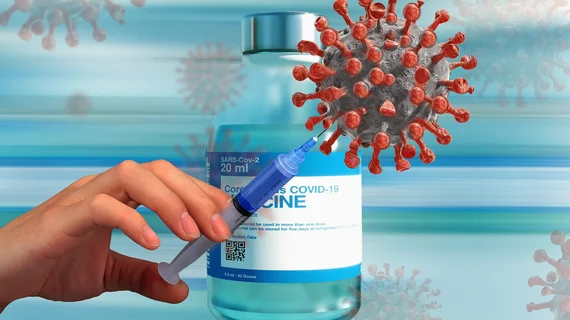COVID-19 vaccine-related imaging tracer uptake may appear weeks after previously thought
Patients who have received their second dose of the Pfizer-BioNTech COVID-19 vaccine may show abnormal imaging tracer uptake weeks after previously thought, experts reported Tuesday.
Up until today, clinicians have largely agreed that vaccine-associated lymph node abnormalities resolve at least six weeks following patients’ second dose. But imaging experts writing April 27 in Radiology reported abnormal radiotracer uptake on PET/CT scans 7-10 weeks after individuals received their second dose of the mRNA-based Pfizer-BioNTech vaccine.
Radiologists and other providers need to take note of this update, Yael Eshet, MD, of Chaim Sheba Medical Center’s Department of Diagnostic Imaging in Israel, and colleagues warned.
“This study shows that avid axillary lymph node uptake on FDG PET/CT can be detected in more than a quarter of our patient population even beyond six weeks after the second dose of the mRNA-based COVID-19 vaccination,” Eshet, also with the Sackler Faculty of Medicine at Tel-Aviv University, and co-authors added. “Physicians should be aware of this potential pitfall.”
Their findings come from an analysis of data gathered prospectively from Chaim Sheba Medical Center. That included 205 adults who showed FDG PET/CT 42 to 71 days following their second shot. After excluding some participants, the final cohort totaled 169 individuals.
Overall, 29% (49/169) had positive axillary uptake 7-10 weeks post-vaccination. Most cases were recorded in week seven (42% of 169) and steadily declined until the final week.
Early last month, radiologists reported seeing more cases of temporary radiotracer uptake in lymph nodes, urging providers to have a plan in place for this “emerging dilemma.”
Nearly a week later, a trio of clinicians released keys to accurately interpreting these PET/CT cases and echoed calls to schedule nonurgent imaging exams 4-6 weeks after vaccination in order to best avoid false-positives.
Despite these past studies, and many more, Eshet et al. noted information is still lacking in this area and recommended providers take note of their new findings as mass vaccine rollouts continue.
Read the entire original research letter here.

